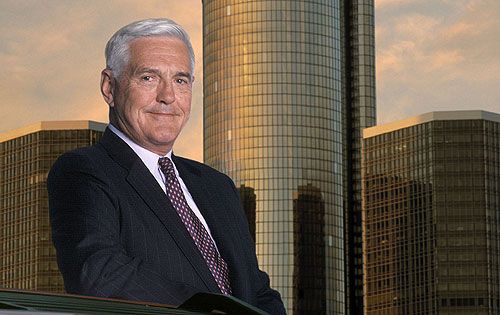AutoWeek is reporting that GM Vice-Chairman Robert Lutz says the company will have to undertake a “massive restructuring” of product plans if the 35 mpg fuel economy standard which passed the House of Representatives yesterday becomes law.
“The minute we have confirmation of the 35-mpg rule, that is the point where we go through all of our forward product plans and probably introduce, frankly, massive restructuring of the product plan,” he said. “A 35-mpg fleet mix means there is a bunch of stuff out there that is going to have to be 40 and 50 mpg.
“We will have to take a look at everything because we’re going to have to come up with a plan which gets us to 2015, 2017, gets us part of the way there, and with clarity on how we’re going to get the rest. Then we will have to start raising prices as we introduce the new technology.”
Really. Why is he telling us? We knew that. Why hasn’t he been telling the rest of GM management, the people that decided to tell Congress that a 35 mpg standard was just fine with the carmakers?
That it boiled down to auto industry executives lacking the courage, craftiness, and foresight to put up a fight was pretty much conceded when Lutz said, “
“I think one of the reasons that everybody said, ‘Yeah, yeah, we’re in agreement with this,’ is because anything, even a horrible alternative, is better than the constant uncertainty.”
Apparently, Lutz is a bit naïve. This is the United States Congress. Just because they pass a law this year doesn’t mean they won’t pass another next year, one even more impossible to reach.
Have the dire predictions of the automakers changed? Not according to Lutz. He says that the new standards will add $600 to $7000 to the cost of a new vehicle and that there is “no way” that GM can get trucks and SUVs to the 35 mpg standard. Not even the new crossovers, such as the Enclave, can meet that standard. The plans for the rear-wheel drive Impala are probably dead, though they’ve been on hold for some time due to concern about the economy rules.
If all of this is true, and there’s no reason to believe it’s not – all the carmakers are saying essentially the same things, even Toyota – then the real question that has to be asked is,
Why did they cave?
For the past half-century, the vehicles that have made profits for the domestic automakers are the large cars. Toyota, too – it likes the profit margin on a Lexus. Detroit has always found it difficult to make money on small cars, at least partly because the difference in the cost of producing a large car and a small car are not as big as the differences in their prices.
Why, then, would a company deliberately agree to the evisceration of the only profitable business they’ve got? Contrary to the implication of Lutz’ remarks, this was not a case of taking a bad deal to avoid a worse deal. This was the worse deal. Moreover, again contrary to Lutz’ implication, this deal does not guarantee that the automakers won’t be facing a new round of legislative problems in a few more years. Nothing in this bill keeps the states from setting their own mileage standards in the guise of setting CO2 emissions standards. So, as a practical matter, the companies did not get stability out of this deal. They got nothing.
For way too long, the auto industry has let the politicians dictate how they will behave. They’ve fallen over each other in an effort to be “green,” to virtually concede that autos are the cause of “global warming” and that they’re the enemy of mankind’s future, rather than the one thing most responsible for the comfort, mobility, and freedom of his present.
They’ve acted like they had something to be ashamed of.
After what they’ve done now, they finally do.

